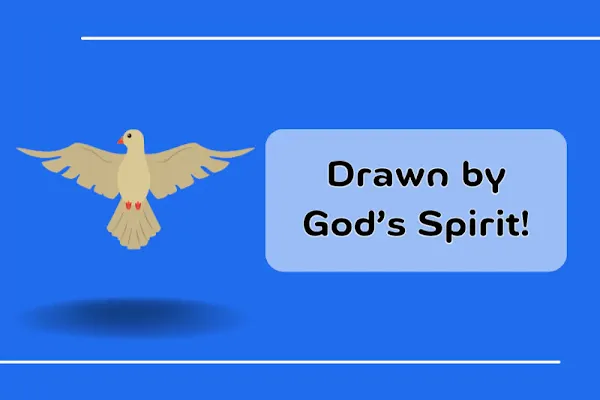Third Week of Easter
27th April 2023 (Thursday) Readings and Reflection
Reading of the Day
First Reading: Acts 8:26-40
26 Now an angel of the Lord said to Philip, “Rise and go toward the south to the road that goes down from Jerusalem to Gaza.” This is a desert place. 27 And he rose and went. And there was an Ethiopian, a eunuch, a court official of Candace, queen of the Ethiopians, who was in charge of all her treasure. He had come to Jerusalem to worship 28 and was returning, seated in his chariot, and he was reading the prophet Isaiah. 29 And the Spirit said to Philip, “Go over and join this chariot.” 30 So Philip ran to him and heard him reading Isaiah the prophet and asked, “Do you understand what you are reading?” 31 And he said, “How can I, unless someone guides me?” And he invited Philip to come up and sit with him. 32 Now the passage of the Scripture that he was reading was this: “Like a sheep he was led to the slaughter and like a lamb before its shearer is silent, so he opens not his mouth. 33 In his humiliation justice was denied him. Who can describe his generation? For his life is taken away from the earth.” 34 And the eunuch said to Philip, “About whom, I ask you, does the prophet say this, about himself or about someone else?” 35 Then Philip opened his mouth, and beginning with this Scripture he told him the good news about Jesus. 36 And as they were going along the road they came to some water, and the eunuch said, “See, here is water! What prevents me from being baptized?” 38 And he commanded the chariot to stop, and they both went down into the water, Philip and the eunuch, and he baptized him. 39 And when they came up out of the water, the Spirit of the Lord carried Philip away, and the eunuch saw him no more, and went on his way rejoicing. 40 But Philip found himself at Azotus, and as he passed through he preached the gospel to all the towns until he came to Caesarea.
Psalm 66:8-9, 16-17, 20
R/. Cry out with joy to God, all the earth Or: Alleluia.
Gospel : John 6:44-51
44 No one can come to me unless the Father who sent me draws him. And I will raise him up on the last day. 45 It is written in the Prophets, ‘And they will all be taught by God.’ Everyone who has heard and learned from the Father comes to me— 46 not that anyone has seen the Father except he who is from God; he has seen the Father. 47 Truly, truly, I say to you, whoever believes has eternal life. 48 I am the bread of life. 49 Your fathers ate the manna in the wilderness, and they died. 50 This is the bread that comes down from heaven, so that one may eat of it and not die. 51 I am the living bread that came down from heaven. If anyone eats of this bread, he will live forever. And the bread that I will give for the life of the world is my flesh.”
Daily Gospel Reflection
The Reflection by Fr. Thumma Mariadas Reddy MSFS{alertWarning}
Main Theme: Drawn by God’s Spirit!
Indicative: Our God is a living God. He lives forever. He gives us His own life and we too will live forever{alertSuccess}
1. In the gospel, the whole discourse is on life and the bread of life. Jesus continues his self-revelatory declaration, saying, “I am the bread of life” and “I am the living bread”. Bread is that what is nourishing and strengthening. ‘Bread of life’ can mean the bread that possesses life, bread that belongs to life. The ‘living bread’ can signify that it is not any other bread that is only short-lived.
2. A contrast is made between Jesus, the bread of life and the other bread and manna as well which are not living. They may give life but that is only temporary. And the life they give is only physical, to sustain the physical life and strength.
3. Further life is not intrinsic to their nature. Rather giving life becomes a function. The function of giving life is put into them. But Jesus not only gives bread to sustain us. He himself is the bread. He immolates himself to give us life.
4. Jesus gives life and this life is intrinsic to his very nature. He is the author of eternal life. The life he gives is eternal and imperishable. The life that Jesus gives is not physical and partial but holistic and interior. It affects the whole person and all aspects of life.
5. The self-revelation of Jesus as the “Bread of life” is meant mainly for a few purposes. One is, realise the divine identity of Jesus and believe deeply in him. Increase the indispensable need of him in our life. Receive him. And be united with him completely just as bread gets assimilated into the entire body. Be nourished and strengthened by him.
6. Finally, become like Jesus, the bread of life for others. Sustain and nurture others like bread. Become a life-giving bread, that is a channel and promoter of a culture of life. We must be taught by God so that we become teachers who teach others.
7. This is what Philip does in the first reading. He is taught by Christ and God. Now he teaches the Ethiopian eunuch and leads him to Jesus.
Imperative: We all must be taught by God. For this, we must be receptive, and be filled and guided by the Spirit{alertSuccess}
